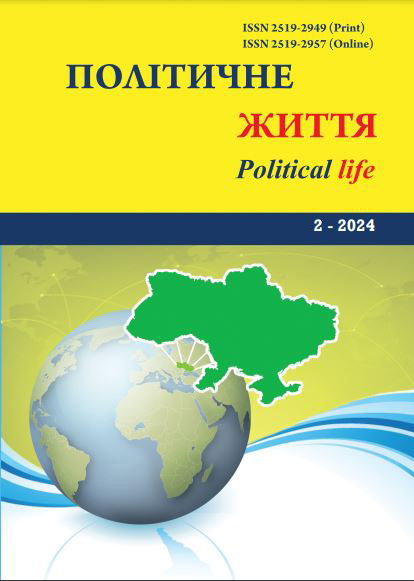State power agenda in the classical liberalism discourse
DOI:
https://doi.org/10.31558/2519-2949.2024.2.2Keywords:
classical liberalism; state power; liberalism; ideology; discourseAbstract
The purpose of the article is to identify the specifics of the coverage of state power issues in the basic theories of the classical liberalism founders (J. Locke, Ch.-L. de Montesquieu, A. Smith and others).
Methods. In methodological terms, the article focuses on the use of research in various areas of political and ideological knowledge. The set of general and special methods of political science became the methodological basis of the article, which provided a comprehensive approach to the problem of identifying the specifics of coverage of state power in the basic theories of the classical liberalism founders.
The methodological approach used to analyze the state power idea in the basic theories of the classical liberalism discourse founders, was the internalist version of the historical approach (St. Toulmin).
Results. It is stated that the issue of natural human rights (to life, liberty and property) became the basis of the classical liberalism discourse: the equality of all people from birth was postulated, the inalienability of natural rights was substantiated (no one can deprive people of these rights or dispose of them). In the conceptions of the classical liberalism discourse founders, the emphasis was mainly on the idea of the importance of the state power, on the idea of the need for the existence of such an institution as the state. The existence of the state was justified by the need to protect and preserve natural human rights. However, the state is called to protect the privacy and freedom of action (within the law), it was also considered that the scope and sphere of its activities should be restricted by setting limits on the spread of state power (the credo of non-interference «laissez faire»). The establishment of such boundaries presupposes the contractual nature of the relationship between state power and the individual, which excludes all forms of paternalism.
References
Zwesper, J. (2000). «Liberalism», Encyclopedia of Political Thought, in Sigov, K., Skurativsky, V., Finberg, L. (Eds.), Kyiv: Dukh i Litera. РР. 203–207.
Toulmin, S. E. (1972). Human Understanding: General Introduction and Part I. Clarendon Press.
Locke, J. (2001). Two treatises on governance. Kyiv: Solomiya Pavlychko Publishing House, Osnovy. 265 p.
Burke, E. (1790). Reflections on the Revolution in France. URL: https://www.earlymoderntexts.com/assets/pdfs/burke1790part1.pdf (accessed: 03.04.2024).
The Declaration of Independence. The unanimous Declaration of the thirteen united States of America. (1776). URL: https://docs.house.gov/meetings/GO/GO00/20220929/115171/HHRG-117-GO00-20220929-SD010.pdf (accessed: 03.04.2024).
Kuts, H. M. (2011). Liberal transformations of political space. Kharkiv: Virovets A. P.; Apostrof. 300 р.
United Nations. (1948). Universal Declaration of Human Rights, 10 December 1948. URL: https://www.un.org/en/about-us/universal-declaration-of-human-rights (accessed: 03.04.2024).
Prychepiy, Ye. (Ed.). (2002). Classics of political thought from Plato to Max Weber. Kyiv: Tandem. 584 p.
Skinner, K. (2003). Liberty before Liberalism. URL: https://www.democraziapura.it/wp-content/uploads/ 2020/08/Quentin-Skinner.-Liberty-before-liberalism.-Cambridge-University-Press-Cambridge-1998.pdf (accessed: 03.04.2024).
Mises, L. von. (2007). Theory and History: An Interpretation of Social and Economic Evolution. Auburn: Ludwig von Mises Institute. URL: https://cdn.mises.org/Theory%20and%20History%20An%20Interpretation%20of%20Social%20and%20Economic%20Evolution_1.pdf (accessed: 03.04.2024).
Montesquieu, Ch. De. (2017). L’esprit des lois. – URL: http://classiques.uqac.ca/classiques/montesquieu/de_esprit_des_lois/partie_1/esprit_des_lois_Livre_1.pdf (accessed: 03.04.2024).
Hobbes, T. (2000). Leviathan of The Matter, Forme and Power of a Commonwealth Ecclesiasticall and Civil. Kyiv: Dukh i Litera. URL: https://shron1.chtyvo.org.ua/Thomas_Hobbes/Leviafan_abo_Sut_budova_ i_povnovazhennia_derzhavy_tserkovnoi_ta_svitskoi.pdf (accessed: 03.04.2024).
Aristotle. (2000). Politics. Kyiv: Osnovy. 239 p. URL: http://litopys.org.ua/aristotle/arist.htm (accessed: 03.04.2024).
Smith, А. (2018). An Inquire into the Nature and Causes of the Wealth of Nations. URL: https://shron1.chtyvo.org.ua/Smit_Adam/Bahatstvo_narodiv_Doslidzhennia_pro_pryrodu_ta_prychyny_dobrobutu_natsii.pdf (accessed: 03.04.2024).
Kuts, H. M. (2011). Transformational Potential of Liberalism in the Political Space. Abstrakt of the D.Sc. diss. (polit. sci). Chernivtsi: Yuriy Fedkovych Chernivtsi National University. 36 р.
Spenser, H. (1884) The Man versus the State, with Six essays on Government, Society and Freedom. URL: http://files.libertyfund.org/files/330/Spencer_0020.pdf (accessed: 03.04.2024).
Mill, J. St. (2001). About freedom: essay. Kyiv: Solomiya Pavlychko Publishing House, Osnovy. 463 p.
Kant, I. (2000). Critique of pure reason. Kyiv: Universe. 504 p.

